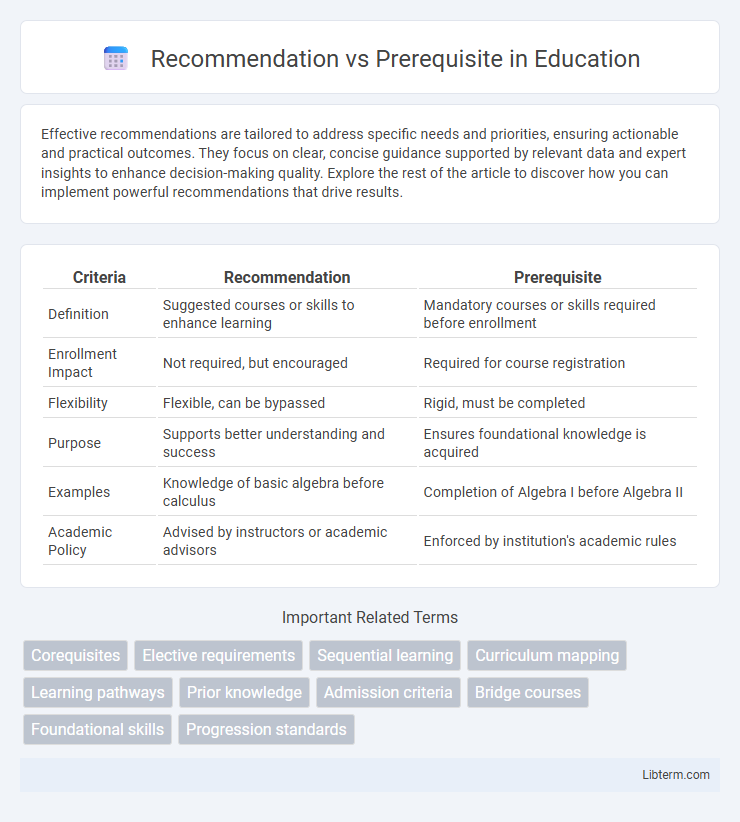Effective recommendations are tailored to address specific needs and priorities, ensuring actionable and practical outcomes. They focus on clear, concise guidance supported by relevant data and expert insights to enhance decision-making quality. Explore the rest of the article to discover how you can implement powerful recommendations that drive results.
Table of Comparison
| Criteria | Recommendation | Prerequisite |
|---|---|---|
| Definition | Suggested courses or skills to enhance learning | Mandatory courses or skills required before enrollment |
| Enrollment Impact | Not required, but encouraged | Required for course registration |
| Flexibility | Flexible, can be bypassed | Rigid, must be completed |
| Purpose | Supports better understanding and success | Ensures foundational knowledge is acquired |
| Examples | Knowledge of basic algebra before calculus | Completion of Algebra I before Algebra II |
| Academic Policy | Advised by instructors or academic advisors | Enforced by institution's academic rules |
Understanding Recommendations and Prerequisites
Recommendations provide guidance or suggestions that enhance understanding or performance but are not mandatory for progression in a course or program. Prerequisites are compulsory requirements that ensure a foundational knowledge base before advancing to more complex topics or coursework. Recognizing the distinction helps learners plan their education path effectively to meet essential qualifications while benefiting from optional enrichment.
Key Differences Between Recommendations and Prerequisites
Recommendations offer guidance or suggestions to improve outcomes without mandating action, whereas prerequisites are mandatory conditions or requirements that must be fulfilled before proceeding. Recommendations provide flexibility and allow choice, while prerequisites establish non-negotiable criteria essential for eligibility or progression. Understanding these distinctions is crucial for clarifying expectations in academic, professional, or technical contexts.
Importance of Prerequisites in Learning
Prerequisites establish foundational knowledge essential for grasping advanced concepts, ensuring effective and efficient learning progression. Without mastering these initial requirements, learners may struggle with comprehension, leading to gaps in understanding and lower retention rates. Prioritizing prerequisites supports structured curriculum design, promoting academic success and deeper subject mastery.
Role of Recommendations in Skill Development
Recommendations guide individuals toward valuable learning opportunities and resources that enhance skill acquisition and professional growth. They provide personalized insights based on industry trends and peer experiences, helping learners prioritize relevant competencies effectively. Unlike prerequisites, which are mandatory baseline requirements, recommendations offer flexible guidance that supports continuous development and adaptability in dynamic career paths.
When to Prioritize Prerequisites Over Recommendations
Prioritize prerequisites over recommendations when foundational knowledge or skills are essential for understanding advanced concepts, ensuring effective learning progression. In academic settings, prerequisites guarantee students possess the necessary background to succeed in subsequent courses, preventing gaps that could hinder comprehension. Industry certifications often require prerequisites to validate competency before advancing to specialized topics or roles.
Common Examples: Recommendations vs Prerequisites
Common examples of recommendations include courses that enhance understanding but are not mandatory, such as learning basic statistics before advanced data analysis. Prerequisites are compulsory requirements like completing Algebra I before enrolling in Algebra II, ensuring foundational knowledge for course success. These distinctions help institutions maintain academic standards and guide student progression effectively.
Impact on Course or Program Success
Recommendations in courses guide students toward beneficial skills or knowledge, enhancing their learning experience without restricting access, which often leads to higher engagement and improved outcomes. Prerequisites ensure foundational competencies are met, preventing students from struggling with advanced material and thereby increasing the likelihood of successful course completion. Properly balanced prerequisites and recommendations optimize program success by aligning student preparedness with course demands, reducing dropout rates and boosting academic performance.
How to Identify Essential Prerequisites
Essential prerequisites can be identified by analyzing course objectives, ensuring foundational knowledge is required before advancing. Reviewing curriculum structures and consulting subject matter experts help determine skills or concepts critical for successful learning outcomes. Clear documentation of these prerequisites in syllabi enhances student preparedness and academic progression.
Leveraging Recommendations for Enhanced Learning
Leveraging recommendations in education helps tailor learning experiences to individual needs, promoting deeper engagement and knowledge retention. Unlike prerequisites, which mandate prior knowledge before progressing, recommendations provide flexible guidance that encourages exploration and skill development without restricting access. By integrating personalized recommendations, educators can enhance learning pathways and support continuous improvement in student outcomes.
Making Informed Decisions: Recommendation vs Prerequisite
Understanding the distinction between recommendation and prerequisite is essential for making informed decisions, as recommendations suggest flexible guidance while prerequisites establish mandatory conditions. Recommendations provide optional advice designed to enhance outcomes without restricting choices, whereas prerequisites define strict requirements that must be met before proceeding. Evaluating these differences helps individuals and organizations allocate resources effectively and comply with necessary standards without unnecessary constraints.
Recommendation Infographic

 libterm.com
libterm.com